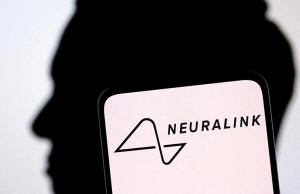|
"Progress is good, and the patient seems to have made a full
recovery, with no ill effects that we are aware of. Patient is
able to move a mouse around the screen by just thinking," Musk
said in a Spaces event on social media platform X.
Musk said Neuralink was now trying to get as many mouse button
clicks as possible from the patient.
Neuralink did not immediately reply to Reuters' request for
further details.
The firm successfully implanted a chip on its first human
patient last month, after receiving approval for human trial
recruitment in September.
The study uses a robot to surgically place a brain-computer
interface implant in a region of the brain that controls the
intention to move, Neuralink has said, adding that the initial
goal is to enable people to control a computer cursor or
keyboard using their thoughts.
Musk has grand ambitions for Neuralink, saying it would
facilitate speedy surgical insertions of its chip devices to
treat conditions like obesity, autism, depression, and
schizophrenia.
Neuralink, which was valued at about $5 billion last year, has
faced repeated calls for scrutiny regarding its safety
protocols. Reuters reported last month that the firm was fined
for violating U.S. Department of Transportation rules regarding
the movement of hazardous materials.
(Reporting by Kanjyik Ghosh in Bengaluru; Editing by Varun H K)
[© 2024 Thomson Reuters. All rights
reserved.]
Copyright 2022 Reuters. All rights reserved. This material may
not be published, broadcast, rewritten or redistributed.
Thompson Reuters is solely responsible for this content.

|
|




